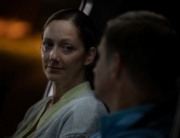

Coming off the heels of her directorial debut Plan B, Natalie Morales’s new film is much smaller in scale but quite impactful all the same. Language Lessons, starring and co-written by Morales and Mark Duplass, is a two-hander about the long-distance friendship between a teacher and student in the wake of a personal tragedy. The gimmick: all of their interactions are done through Zoom calls and Facetime messages. The charming leads guide us through this period of healing while making the journey feel as valid as any grand adventure.
As its title implies, the movie takes us into the Spanish language sessions between Cariño (Morales), a Costa Rican instructor, and Adam (Duplass), a gay Oakland suburbanite whose husband, Will (Desean Terry, heard in the background), surprises him with the 100-week course. In contrast to Cariño’s modest camera corner, Adam lives in a pretty lavish house, complete with a pool and piano room. Yet he’s awkward about bringing up the wealth, having only recently acquired it from his marriage. This uncertainty even extends to Adam’s language issues: he can hold a conversation in Spanish, but struggles to translate a number of words during their first conversation. Despite some initial awkwardness, they soon find a rhythm, and Adam becomes more enthusiastic about these classes.
Then tragedy strikes. When Cariño calls Adam for their next meeting, she finds him sprawled out on the bed, struggling to cope with a sudden loss and breaking down in front of the camera. He needs time to mourn, but eventually he goes back to the Spanish lessons as a form of therapy, something to keep his mind distracted. There’s no exact time line to indicate how many weeks pass in between meetings as Adam and Cariño’s exchanges evolve into something more casual than scholarly. It becomes clear that he views her as a confidant, even demonstrating concern for her well-being after she unwittingly reveals bruises on her face. It’s the kind of reveal that leads viewers to draw dark conclusions, even as it gradually makes us question whether this relationship is becoming more than what it was initially advertised.
There’s a unique sense of realism to how Language Lessons utilizes its screencast framing device. Playing out a plot through computer and phone screens has been done before for purposes of building tension (Unfriended) or investigative drama (Searching), but here it actually feels like your traditional Zoom call. Video footage occasionally appear out of focus and faces freeze up as the dialogue remains audible, but the locations, for the most part, are static room shots. Solo scenes, by comparison, are done for purposes of humor or confession, such as when Adam and Cariño have a funny standoff to learn the her most embarrassing teaching story. Their digital friendship feels timely, thanks in large part to the pandemic making Zoom conversation a more frequent part of our daily lives. Something about Language Lessons’ story invokes that innate human need to be with anyone who’ll listen, even when they’re located thousands of miles away.
Thanks to the actors’ charismatic rapport, it’s a lot of fun to watch these characters bounce off one another and come to terms with their vulnerabilities. Adam certainly isn’t romantically attracted to Cariño, but questions of whether he’s overstepping any boundaries due to misconception or privilege is certainly felt from the other side. This leads to Cariño becoming more distant or frustrated, lashing out at Adam but refusing to shed light on what’s bothering her. The film certainly plays with our expectations through these confessions, and while their dramatization can feel a bit overwrought, it never loses sight of the human element that brought them together. At the center of it all, Adam just likes being around Cariño, regardless of how little they know about each other beyond the camera screen.
Language Lessons is a tragic story, but also a very hopeful one. The juxtaposition of sadness and humor, blended with its protagonists’ likability, grants the story an intimacy that speaks to our current moment in time. After all that’s happened since 2020, the need to grieve and rediscover friendship in any form now feels like a hot commodity. Just because a friend is discovered through Zoom doesn’t make it any less real.
















Leave A Comment